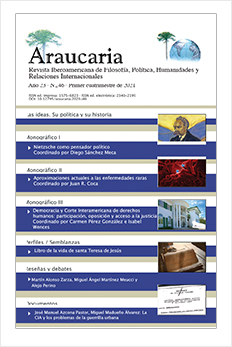Political fraternity and rare diseases
DOI:
https://doi.org/10.12795/araucaria.2021.i46.17Keywords:
Rare diseases, orphan drugs, solidarity, fraternity, public health ethics, bioethicsAbstract
Rare diseases generally receive less funding for their medical research and treatments than other diseases. Apart from well-known scientific and economic explanations, there are two major ethical positions regarding this fact, the one that approves it for reasons of utilitarian ethics, and the one that condemns it by insisting on egalitarian and individual rights reasons. In this article, I analyse the problems of both types of moral justification, and propose an ethical alternative based on the idea of political fraternity that, applied to rare diseases, avoids the worst consequences of both utilitarianism and the language of individual rights to health and mere egalitarianism.
Downloads
References
Culyer, A.J. y Wagstaff, A., “Need, equity and equality in health and health care”, Discussion Paper, 95, Centre for Health Economics, Universidad de York, 1992
European Comission, DG Health and Food Safety, Public health, rare diseases.
Mascalzoni, A., Petrini, C., Taruscio, D. y Gainotti, S., “The Role of Solidarity(-ies) in Rare Diseases Research”, Advances in Experimental Medicine and Biology, n. 1031, 2017.
National Institute for Clinical Excellence. NICE Citizens Council Report. Ultra Orphan Drugs. 2004.
Nguengang Wakap, S., Lambert. D.M., Olry, A. et al. “Estimating cumulative point prevalence of rare diseases: analysis of the Orphanet database·. Eur J Hum Genet vol. 28, 2020, pp. 165–173. https://doi.org/10.1038/s41431-019-0508-0.
OMS, El derecho a la salud, Folleto informativo nº 31, 2008.
Pinxten, W., Denier, Y., Dooms, M., Cassiman, J.J. y Diericks, K., “A fair share for the orphans: ethical guidelines for a fair distribution of resources within the bounds of the 10-year-old European Orphan Drug Regulation”, Journal of Medical Ethics, vol. 38, n. 3, 2012.
Prainsack, B. y Buyx, A.: Solidarity: Reflections on an Emerging Concept in Bioethics, NcoB, London, 2011.
Puyol, A., ¿A quién debemos dejar morir?, Claves de Razón Práctica, n. 103, 2000.
Puyol, A., El discurso de la igualdad, Barcelona, Crítica, 2001.
Puyol, A., “La idea de solidaridad en salud pública”, Revista de Bioética y Derecho, n. 40, 2017.
Puyol, A., “Del derecho a la salud al racionamiento sanitario”, Anales de la Cátedra Francisco Suárez, n. 52, 2018.
Puyol, A., Political Fraternity. Democracy beyond Freedom and Equality, New York, Routledge, 2019.
Rodríguez, R., Spargo, T. y Seoane-Vázquez, E., “Ethical imperatives of timely Access to orphan drugs: is posible to reconcile economic incentives and patients’ health needs?”, Orphanet Journal of Rare Diseases, vol. 12, n. 1, 2017.
Williams, A., “Economics, QALYs and medical ethics”, Discussion Paper, 121, Centre for Health Economics, Universidad de York, 1995.
Yin, W., “R&D policy, agency costs and innovation and personalized medicine”, J. Health Econ. vol. 28, n. 5, 2009.
Downloads
Published
How to Cite
Issue
Section
License
Las ediciones impresa y electrónica de esta Revista son editadas por el Secretariado de Publicaciones de la Universidad de Sevilla, siendo necesario citar la procedencia en cualquier reproducción parcial o total.Salvo indicación contraria, todos los contenidos de la edición electrónica se distribuyen bajo una licencia de uso y distribución “Creative Commons Atribución-NoComercial-SinDerivar 4.0 Internacional”








